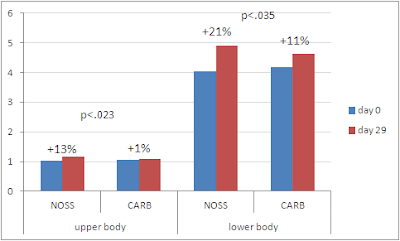 |
| Image 1: Supplemental double-whammy. VPX' now "scientifically proven" pre- & postworkout products |
As in previous studies (Willoughby. 2007; Willoughby. 2009), Darryn S. Willoughby and his colleagues availed themselves of a buckload of VPX supplements and recruited 19 previously recreationally active, yet untrained (*) men with an average age of 22.8 +/-4.67 years, a height of 179.5 +/-6.38 cm and a total body mass of 79.1 +/-16.13 kg for another study into the effects of two supplements, which are supposed to "advance you to the next level of fitness" (VPX. 2011). Strength and body composition (body fat measured reliably by DEXA, not body-impedance), venous blood sampling and muscle biopsies were performed on day 0 and day 29 of the 4-week study period, in the course of which the participants underwent a standardized resistance training protocol (upper-/lower-body split, 4x à week), which mirrored the one that had been used in Willoughby. 2009 already (*).
 |
| Figure 1: Illustration of the training regimen (based on Willoughby. 2011) |
The NO Shotgun approach to protein NO SyntheSize???
 |
| Figure 2: Ingredient profiles of No Shotgun and No SyntheSize |
Although there were no specifically dietary guidelines, the research did at least collect some nutritional data based on a 4-day questionnaire all participants had to answer at the beginning and end of the study. While there was a slight reduction in the total caloric intake in the carb group (interestingly mainly from carbohydates), neither the intra-group changes, nor the inter-group differences reached statistical significance.
More muscle, less fat! Trainee, what more can you ask for?
That there were no differences is yet something you cannot say of the changes in body composition the study participants underwent in the course of this 28-day intervention.
 |
| Figure 3: Relative changes (compared to baseline) in body composition after 16 strength training sessions in 28 days with either 54g of maltodextrin or 27g of NO Shotgun and 27g NO Synthesize pre- and postworkout (Willoughby. 2011) |
 |
| Figure 4: Changes in upper and lower body strength (in kg/kg body weight during bench press and leg press at 1RM) after 16 strength training sessions in 28 days with either 54g of maltodextrin or 27g of NO Shotgun and 27g of NO Synthesize pre- and postworkout (Willoughby. 2011) |
* you may have wondered what all the asterisks in the previous paragraphs meant... well, they indicate specificities in the study design detractors may call "precautions that ensure that the VPX supplements are sitting pretty" ... I mean the exact same supplementation protocol performed on a bunch of veteran bodybuilders would probably not have elicited any measurable effects on body composition - keep that in mind when you interpret the results.
Now, it obviously should not surprise you that the protein (and leucine) loaden and creatine, beta-alanine spiked workout supplements outperform simple sugar water. It is thus more interesting to take another look at the data from the 2009 "NO Shotgun only"-study, Willoughby et al. have done (Willoughby. 2009). On the exact same training protocol, yet with only 27g of NO Shotgun or placebo 30min preworkout, the participants lost less body fat (-1.21%), but gained the exact same ~4% of lean mass and comparable increases in bench press and leg press 1RM (+8.82% and +18.4%, respectively). Scientifically proven ingredients make scientifically proven products
I leave it up to you whether or not the results of this study will influence your next supplement purchase - after all, even the VPX guys will be aware that their supplements are not so unique that intelligent people like you would not be able to identify the key ingredients in their products (EAAs, hydrolized protein, creatine, beta alanine, some workout-boosting stimulants, etc.) and realize that there are way more than those two products which would probably have produced identically (within statistical margins) results, if, and here we've come full circle, if their respective manufacturers had the money and the balls to do scientific studies on their products.